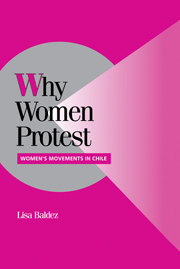Book contents
Preface
Published online by Cambridge University Press: 06 July 2010
Summary
On October 16, 1998, British authorities arrested Chile's former military dictator, General Augusto Pinochet, as he recovered from back surgery at a private London clinic. Spanish judge Baltasar Garzón had requested that London police detain Pinochet so that he could be extradited to Spain and tried for human-rights violations. Just prior to the arrest, Pinochet seemed to be basking in glory and ease, symbolized by his friendship with Margaret Thatcher, Pinochet's free-market heroine. Pinochet's arrest focused the world's attention on Chile. In Chile, the event galvanized the dictator's old supporters into action. Scores of women flew to London on chartered jets to support the general. They held vigils to pray for Pinochet's return to Chile. Their speeches invoked the same rhetoric they had used against Chilean President Salvador Allende nearly three decades earlier. “We women will fight until the end so that a Marxist government never returns to power in this country,” said Patricia Maldonado, leader of a group called “Women for the Dignity of Chile,” according to the Santiago Times (December 16, 1998). In Santiago, pro-Pinochet women burned British flags outside the British and Spanish embassies to demand his return.
Women's fervor for Pinochet provides a stark contrast to the view of Latin American women as supporters of democracy. Most of the news about women in Latin America in the past two decades has highlighted women's efforts to promote the return to civilian rule and bring human-rights violators to justice. In Chile, for example, women formed a movement against the military in the late 1970s and 1980s.
- Type
- Chapter
- Information
- Why Women ProtestWomen's Movements in Chile, pp. xiii - xviiiPublisher: Cambridge University PressPrint publication year: 2002

